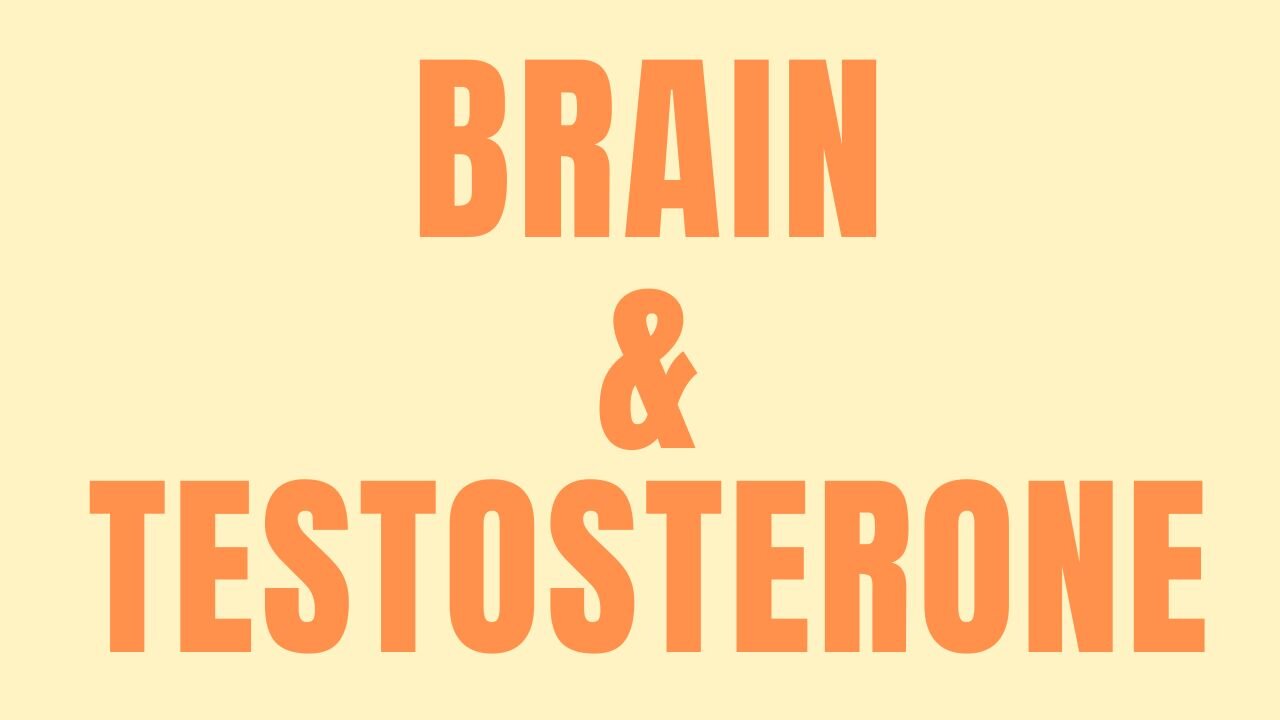Premium Only Content

The Impact of Testosterone on Brain Health: Unveiling the Cognitive Benefits Raindrops1 com
The Impact of Testosterone on Brain Health: Unveiling the Cognitive Benefits
Introduction:
In the realm of neuroscience, the influence of hormones on brain function has garnered increasing attention. Among these hormones, testosterone—a predominantly male hormone, though present in both genders—has emerged as a subject of profound interest. Beyond its well-known roles in muscle growth, libido, and overall vitality, recent research has shed light on its impact on brain health and cognitive function. Understanding the intricate relationship between testosterone and the brain could potentially pave the way for novel therapeutic interventions and lifestyle approaches to bolster cognitive well-being.
The Brain-Testosterone Connection:
Testosterone, primarily produced in the testes in males and in smaller quantities in the ovaries and adrenal glands in females, is a steroid hormone with multifaceted effects throughout the body. Within the brain, testosterone exerts its influence through various mechanisms. It interacts with androgen receptors present in neural tissue, modulates neurotransmitter systems, and influences the structure and function of brain regions involved in cognition and emotion.
Cognitive Benefits of Testosterone:
Research indicates that testosterone plays a pivotal role in several cognitive domains, including memory, attention, spatial abilities, and executive functions. Studies have shown that individuals with higher levels of testosterone tend to exhibit better performance in cognitive tasks, such as verbal fluency, spatial reasoning, and working memory. Moreover, testosterone has been linked to enhanced cognitive resilience, reducing the risk of cognitive decline and neurodegenerative conditions such as Alzheimer's disease.
Memory and Learning:
One of the most notable cognitive benefits associated with testosterone is its impact on memory and learning. Animal studies have demonstrated that testosterone administration can improve spatial memory and learning abilities. In humans, higher testosterone levels have been correlated with better performance on memory tasks, suggesting a potential role in memory consolidation and retrieval processes.
Attention and Focus:
Testosterone also appears to influence attentional processes and cognitive focus. Research suggests that individuals with higher testosterone levels exhibit greater attentional control and sustained focus, leading to improved performance in tasks requiring concentration and vigilance. This aspect of testosterone's effect on cognition may have implications for enhancing productivity and cognitive performance in various domains.
Mood Regulation:
Beyond cognitive function, testosterone plays a role in emotional regulation and mood stability. Low testosterone levels have been associated with symptoms of depression, anxiety, and irritability. Conversely, optimizing testosterone levels through hormone replacement therapy or lifestyle modifications may alleviate mood disturbances and promote emotional well-being, thereby indirectly supporting cognitive health.
Neuroprotective Effects:
Emerging evidence suggests that testosterone possesses neuroprotective properties, shielding the brain from age-related degeneration and pathological processes. Testosterone has been shown to promote neuronal survival, enhance synaptic plasticity, and mitigate neuroinflammation, all of which contribute to the preservation of cognitive function across the lifespan. These neuroprotective effects underscore the importance of maintaining optimal testosterone levels for long-term brain health.
Implications for Health and Aging:
The cognitive benefits of testosterone have significant implications for health and aging. As individuals age, testosterone levels naturally decline, potentially contributing to age-related cognitive decline and vulnerability to neurodegenerative diseases. Strategies aimed at preserving or augmenting testosterone levels through lifestyle modifications, dietary interventions, and hormone replacement therapy may offer a promising avenue for mitigating cognitive decline and promoting healthy aging.
Conclusion:
In conclusion, testosterone exerts a profound influence on brain health and cognitive function, encompassing memory, attention, mood regulation, and neuroprotection. Understanding the intricate interplay between testosterone and the brain opens new avenues for therapeutic interventions and lifestyle strategies aimed at optimizing cognitive well-being across the lifespan. By harnessing the cognitive benefits of testosterone, we may empower individuals to safeguard their brain health and preserve cognitive function as they age.
-
 LIVE
LIVE
megimu32
2 hours agoOn The Subject: Why K-Pop Demon Hunters Feels Like 90s Disney Again
113 watching -
 1:38:28
1:38:28
Glenn Greenwald
5 hours agoThe Fraudulent GOP War Against Tucker and Nick Fuentes; Dick Cheney: Hero of the Resistance; Lindsey Graham's Deranged RJC Comments | SYSTEM UPDATE #544
75K81 -
 LIVE
LIVE
ThePope_Live
54 minutes agoRedsack with the boys Cheap, Jah and Nova!
59 watching -
 LIVE
LIVE
Hernandez2787
4 hours agoArc Raiders - 1st Playthrough/ Celebrating My Anniversary as Sergeant First Class in the US Army
53 watching -
 48:42
48:42
Donald Trump Jr.
5 hours agoCommunism vs Common Sense, What's Next for NYC? | TRIGGERED Ep.289
130K255 -
 LIVE
LIVE
JahBlessCreates
52 minutes ago🎉Big Vibes - Gaming with Cheap, Pope, and Nova
19 watching -
 1:31:25
1:31:25
The Charlie Kirk Show
4 hours agoTHOUGHTCRIME Ep. 104 — Post-Election Palette Cleanser + Tucker/Fuentes Interview Reaction
91.7K29 -
 LIVE
LIVE
tminnzy
3 hours agoSmooth Moves Only 💨 | Naraka: Bladepoint Chill Gameplay | !gx
19 watching -
 1:04:33
1:04:33
BonginoReport
5 hours agoWill The LA Dodgers Dodge WH Visit?! - Nightly Scroll w/ Hayley Caronia (Ep.172) - 11/06/2025
48.8K68 -
 3:23:13
3:23:13
Tundra Tactical
6 hours ago $0.01 earnedDadlefield Game Night BF6 New Update Weapon Grind
28.5K5